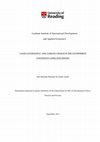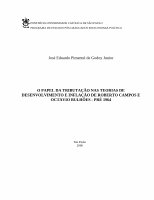Papers by Jose Eduardo Pimentel de Godoy Junior
Este trabalho objetiva verificar, por meio de pesquisa documental baseada principalmente em liter... more Este trabalho objetiva verificar, por meio de pesquisa documental baseada principalmente em literatura estrangeira (dada a escassez de literatura nacional sobre o tópico), se os riscos fiscais associados à Mudança Climática estão refletidos nos relatórios de passivos contingentes dos governos (e no caso brasileiro, no Anexo de Riscos Fiscais) em conformidade com princípios de “boa governança” e oferecer sugestões para aprimorar os relatórios.

Revista Cadernos de Finanças Públicas, 2022
This article describes the current Brazilian legal framework (fiscal rules) regarding the financi... more This article describes the current Brazilian legal framework (fiscal rules) regarding the financing of federal public spending and analyzes what were the main sources of financing for the Central Government in 2020, highlighting the lessons and challenges that the COVID-19 pandemic brought to Brazil. At the federal level, the main traditional sources of public financing reside in cash availability from previous years, taxation and other government own revenues, the placement of securities in the market, and transfers from the Central Bank to the Treasury. In normal situations, fiscal rules limit financing from traditional sources and prohibit the issue of money to finance fiscal expenditures. However, in exceptional situations, such as those generated by COVID-19, where traditional sources may be insufficient, the need is created to make fiscal rules more flexible in order to meet the temporary and emergency needs of the country.

Cadernos de Financas Publicas 02 2022, 2022
Este artigo descreve o atual arcabouço legal brasileiro (regras fiscais) em relação ao financiame... more Este artigo descreve o atual arcabouço legal brasileiro (regras fiscais) em relação ao financiamento da despesa pública federal e analisa quais foram as principais fontes de financiamento do Governo Central em 2020, destacando as lições e desafios que a pandemia da COVID-19 trouxe para o Brasil. No âmbito federal, as principais fontes tradicionais de financiamento público residem na disponibilidade de caixa de anos anteriores, na tributação e demais receitas próprias do governo, na colocação de títulos no mercado e nas transferências do Banco Central para o Tesouro. Em situações normais, as regras fiscais limitam o financiamento das fontes tradicionais e proíbem a emissão de moeda para financiar gastos de natureza fiscal. Porém, em situações excepcionais, como as geradas pela COVID-19, onde as fontes tradicionais podem ser insuficientes, cria-se a necessidade de flexibilizar as regras fiscais de modo a atender as necessidades temporárias e emergenciais do país.

"Government Contingent Liabilities are a huge source of fiscal risks, one of the main problems co... more "Government Contingent Liabilities are a huge source of fiscal risks, one of the main problems countries face nowadays to achieve fiscal sustainability, an important condition in the development process. The best way to reduce their exposure to these risks is by adequate risk management procedures, based on good practices. Climate Change is another important challenge countries have to face in the development process and due to its potential fiscal risks is also considered a huge contingent liability.
This dissertation aims to verify if countries disclose Climate Change effects in their central government contingency liabilities´ reports according to “good governance” principles and suggest improvements. The methodology used is desk-based research, mainly literature review, using “good governance” approach as the theoretical framework to verify the adequacy of the reports.
To achieve its goal, it clarifies the main concepts used in this dissertation (governance, “good governance”, accountability, fiscal risks, fiscal sustainability and government contingent liability) and therefore provides three conditions that should be present in the GCL reports in order to comply with “good governance” principles: a) to disclose the information in one single and well structured report; b) to disclose Climate Change risks; and c) to disclose the measures taken by the country to tackle them. Countries that do not comply with the first condition (to publish their GCL reports in one single document) were excluded from the case studies. Hence, only seven countries remained to receive further analysis: Australia, Brazil, Chile, Colombia, Indonesia, New Zealand, and Pakistan.
Even these seven countries do not fully complied with the other two requirements and four problems were detected as the main causes of their failure: lack of IMF and law requirements, fiscal opportunism behaviour, bad risk management framework and difficulties to quantify Climate Change. In order to overcome them, it is suggested that:
.
The IMF´s manuals and national legislation should explicitly recommend the disclosure of Climate Change (even as unquantifiable) and the policies to tackle it in the GCL reports;
Investors, credit rating agencies and civil society should impose sanctions against governments who conceal relevant fiscal risk information;
The GCL Reports should include a table with the name of the chief of executive and its party responsible for past GCL;
Country legislation should be clear about definition of responsibilities regarding fiscal risks management; and
Countries should adopt the seven “good governance” steps of the risk management´s framework.
The disclosure of Climate Change´s information, based on “good governance” principles, may bring three positive aspects: firstly, it improves the government´s risk management; secondly, it raises the awareness of the Climate Change problem and hence the pressure on governments to seriously tackle it; and thirdly, it increases fiscal transparency and accountability, which improves the country´s credibility before the society and credit rating agencies.
Governments, market and civil society have their own responsibility in this process. Without changes in the reports, the path to development and the task to overcome major problems, like Climate Change, can become even harder.
Key words: good governance, contingent liability, climate change, fiscal risks.
Number of words: 10,845"

The present text was conducted in order to construct a panel of Roberto Campos and Octavio Bulhõe... more The present text was conducted in order to construct a panel of Roberto Campos and Octavio Bulhões’s thoughts concerning issues related to taxation, development and inflation in the period before 1964. The bibliography used consists essentially in books, magazines and newspapers articles written by Campos and Bulhões between 1950 and 1964 - year that the authors have assumed the command of the economy and started to implement the PAEG and the Tributary Reform of 1966. Initially, the national debate and the authors’ concepts of development and inflation – important backgrounds understanding of their ideas on taxation - will be analyzed. Afterwards, their tributary ideas will be examined in order to verify their role in their development and inflation’s projects. This analysis show that taxation had a double role: first, to stimulate development by conducting resources to encourage strategic sectors; and second, to keep inflation under control by reducing public deficit, aggregate demand and the impact on prices from instability between supply and demand.
Book by Jose Eduardo Pimentel de Godoy Junior








Uploads
Papers by Jose Eduardo Pimentel de Godoy Junior
This dissertation aims to verify if countries disclose Climate Change effects in their central government contingency liabilities´ reports according to “good governance” principles and suggest improvements. The methodology used is desk-based research, mainly literature review, using “good governance” approach as the theoretical framework to verify the adequacy of the reports.
To achieve its goal, it clarifies the main concepts used in this dissertation (governance, “good governance”, accountability, fiscal risks, fiscal sustainability and government contingent liability) and therefore provides three conditions that should be present in the GCL reports in order to comply with “good governance” principles: a) to disclose the information in one single and well structured report; b) to disclose Climate Change risks; and c) to disclose the measures taken by the country to tackle them. Countries that do not comply with the first condition (to publish their GCL reports in one single document) were excluded from the case studies. Hence, only seven countries remained to receive further analysis: Australia, Brazil, Chile, Colombia, Indonesia, New Zealand, and Pakistan.
Even these seven countries do not fully complied with the other two requirements and four problems were detected as the main causes of their failure: lack of IMF and law requirements, fiscal opportunism behaviour, bad risk management framework and difficulties to quantify Climate Change. In order to overcome them, it is suggested that:
.
The IMF´s manuals and national legislation should explicitly recommend the disclosure of Climate Change (even as unquantifiable) and the policies to tackle it in the GCL reports;
Investors, credit rating agencies and civil society should impose sanctions against governments who conceal relevant fiscal risk information;
The GCL Reports should include a table with the name of the chief of executive and its party responsible for past GCL;
Country legislation should be clear about definition of responsibilities regarding fiscal risks management; and
Countries should adopt the seven “good governance” steps of the risk management´s framework.
The disclosure of Climate Change´s information, based on “good governance” principles, may bring three positive aspects: firstly, it improves the government´s risk management; secondly, it raises the awareness of the Climate Change problem and hence the pressure on governments to seriously tackle it; and thirdly, it increases fiscal transparency and accountability, which improves the country´s credibility before the society and credit rating agencies.
Governments, market and civil society have their own responsibility in this process. Without changes in the reports, the path to development and the task to overcome major problems, like Climate Change, can become even harder.
Key words: good governance, contingent liability, climate change, fiscal risks.
Number of words: 10,845"
Book by Jose Eduardo Pimentel de Godoy Junior
This dissertation aims to verify if countries disclose Climate Change effects in their central government contingency liabilities´ reports according to “good governance” principles and suggest improvements. The methodology used is desk-based research, mainly literature review, using “good governance” approach as the theoretical framework to verify the adequacy of the reports.
To achieve its goal, it clarifies the main concepts used in this dissertation (governance, “good governance”, accountability, fiscal risks, fiscal sustainability and government contingent liability) and therefore provides three conditions that should be present in the GCL reports in order to comply with “good governance” principles: a) to disclose the information in one single and well structured report; b) to disclose Climate Change risks; and c) to disclose the measures taken by the country to tackle them. Countries that do not comply with the first condition (to publish their GCL reports in one single document) were excluded from the case studies. Hence, only seven countries remained to receive further analysis: Australia, Brazil, Chile, Colombia, Indonesia, New Zealand, and Pakistan.
Even these seven countries do not fully complied with the other two requirements and four problems were detected as the main causes of their failure: lack of IMF and law requirements, fiscal opportunism behaviour, bad risk management framework and difficulties to quantify Climate Change. In order to overcome them, it is suggested that:
.
The IMF´s manuals and national legislation should explicitly recommend the disclosure of Climate Change (even as unquantifiable) and the policies to tackle it in the GCL reports;
Investors, credit rating agencies and civil society should impose sanctions against governments who conceal relevant fiscal risk information;
The GCL Reports should include a table with the name of the chief of executive and its party responsible for past GCL;
Country legislation should be clear about definition of responsibilities regarding fiscal risks management; and
Countries should adopt the seven “good governance” steps of the risk management´s framework.
The disclosure of Climate Change´s information, based on “good governance” principles, may bring three positive aspects: firstly, it improves the government´s risk management; secondly, it raises the awareness of the Climate Change problem and hence the pressure on governments to seriously tackle it; and thirdly, it increases fiscal transparency and accountability, which improves the country´s credibility before the society and credit rating agencies.
Governments, market and civil society have their own responsibility in this process. Without changes in the reports, the path to development and the task to overcome major problems, like Climate Change, can become even harder.
Key words: good governance, contingent liability, climate change, fiscal risks.
Number of words: 10,845"